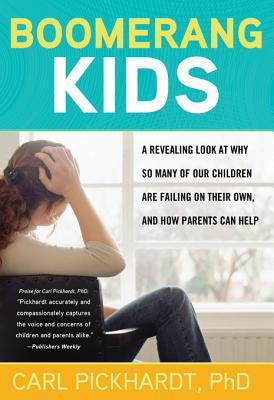
Boomerang Kids
A Revealing Look at Why So Many of Our Children Are Failing on Their Own, and How Parents Can Help
کتاب های مرتبط
- اطلاعات
- نقد و بررسی
- دیدگاه کاربران
نقد و بررسی

May 16, 2011
Pickhardt, psychologist and author (Why Good Kids Act Cruel), examines the relationship between parents and their older children in this timely and practical book. The author analyzes the stages of adolescence, including a fourth stage (between the years of 18 to 23), which he identifies as trial independence. During this period, young adults often set out on their own, only to confront challenges that are likely to cause them to "boomerang" home again. Pickhardt addresses 11 common issues, including missing home and family, managing increased freedom, flunking out of college, unemployment, roommate problems, broken love relationships, substance abuse, indebtedness, stress, emotional crisis, and fear of the future. He concludes each with a "parenting prescription," describing ways parents can help kids deal with these daunting challenges and learn from their experiences and mistakes. Throughout, Pickhardt emphasizes that parents should neither criticize nor punish during this stage of a child's life: the parent/child relationship is now "horizontal" rather than "vertical" and empathy, encouragement, and advice without judgment is required. Although parents and kids alike may feel the stress and pressure of the "trial independence" idea proposed here, Pickhardt reassures that this period of transition is normal, natural, and rife with useful life lessons.

August 1, 2011
Parenting expert and therapist Pickhardt (Why Good Kids Act Cruel: The Hidden Truth About the Pre-Teen Years, 2010, etc.) tackles the issue of recently graduated students failing in the "real world" and provides suggestions on how concerned parents can help.
The author, who writes the parenting blog "Surviving (Your Child's) Adolescence" for Psychology Today, begins by defining the concept of adolescence in all its stages before investigating the concept of delayed maturity (what he terms "trial independence") and what that means for your child. Pickhardt offers a practical guide for understanding and supporting early adults as individuals while still respecting their nascent freedom. Children who fail on their own often find themselves returning to their original state—back under their parents' roof. The author candidly discusses how parenting styles must evolve to create sustainable relationships as children first enter adulthood. Each chapter provides fictitious examples of a challenge a late-stage adolescent will face while entering into a living and working situation that is entirely self-supported. The strength of the book is its thoroughness—the author draws from his experiences counseling parents and children alike in order to provide realistic solutions to problems both will face during this transitional period.
A must-read for any parent frustrated or heartbroken over their child's difficulties striking out on their own.
(COPYRIGHT (2011) KIRKUS REVIEWS/NIELSEN BUSINESS MEDIA, INC. ALL RIGHTS RESERVED.)

June 1, 2012
According to practicing psychologist Pickhardt (The Connected Father), 85 percent of college grads move back home with Mom and Dad after graduation, and his latest book is meant to help reverse that trend. He advocates for parents to stop managing their older children and start mentoring them, by forgoing corrective discipline and emphasizing instead a coaching role. This trial independence will help postgrad kids handle the 11 most common challenges young people face, like managing increased freedom, unemployment, and broken romantic relationships. Pickhardt's style is a bit dry, but his advice is sound. Ideally, parents will read this before their adolescent boomerangs back into the house. (BookSmack, ow.ly/aNVCS)
Copyright 2012 Library Journal, LLC Used with permission.

























دیدگاه کاربران